2016 | Google
Global Searches for a U.S. President
Interactive, Dataviz, Storytelling, and Experience
In the lead-up to the 2016 election, Google searches for the two major–party candidates were spiking around the world. Google News Lab contacted Accurat to design a data–driven, public–facing web experience that would show how Trends data could be leveraged for reporting. Inspired by the idea of the U.S. President as the "leader of the free world," we built a web experience to show how the rest of the world was searching for Hilary Clinton and Donald Trump.
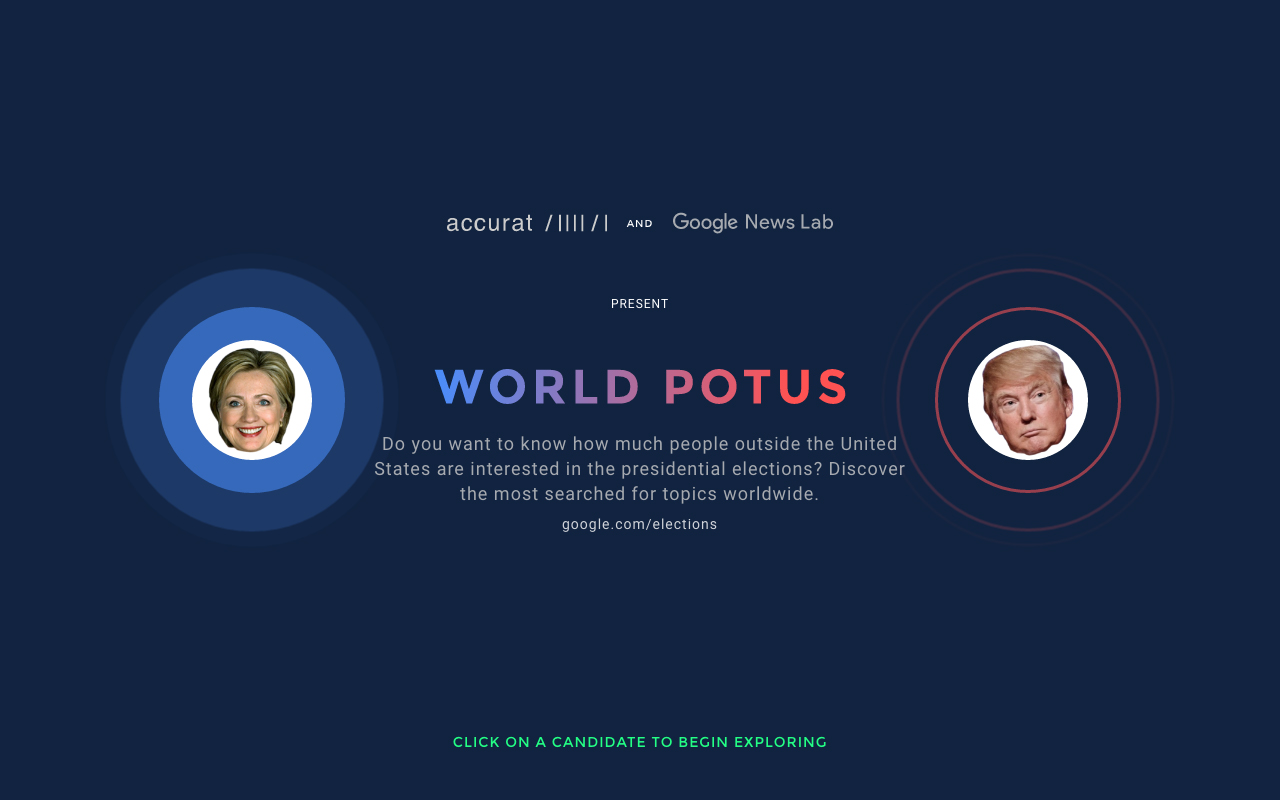
Brief
The Google News Lab is a team of journalists and entrepreneurs who work collaboratively on innovative reporting projects. In 2016, the organization and the department of Visual Journalism at the University of Miami contacted Accurat to lead the latest in a series of initiatives that showcased Google data through visualization. In response to the sky–high, global stakes of the U.S. Presidential election that year, we jumped at the chance to build an application that shed light on population neglected in most media coverage: that of the world at–large.
Process
We began by referencing Google Trends to discover the top 14 most–searched–for U.S. policy subjects. The list included both domestic affairs (Black Lives Matter, healthcare) and international ones (the Transpacific Partnership, foreign policy). To analyze these topics relative to the election, we narrowed criteria to only include searches that involved one of the candidates' names (i.e. "Hilary Clinton economy"). We then took a look at the geographical origins of queries.
Because Google Trends only shows country data, we had to invent a formula for aggregation to show the search patterns for regions and continents. We assigned individual nations weighted values based on population and ratio of active internet users and combined these numbers for composite values. Though estimates, these figures nonetheless expressed a magnitude of interest, if not a precise value.
In the design stage, we sought to convey the limits of our system rather than trying to obscure them. (If the 2016 election taught us anything, it was that measures of public sentiment are imperfect). Furthermore, set to refresh every 24 hours, we anticipated that rankings would fluctuate each day, and might even totally transform overnight if a major media event occurred. We brainstormed ways to smoothly present shifts, both small and seismic.
Because Google Trends only shows country data, we had to invent a formula for aggregation to show the search patterns for regions and continents. We assigned individual nations weighted values based on population and ratio of active internet users and combined these numbers for composite values. Though estimates, these figures nonetheless expressed a magnitude of interest, if not a precise value.
In the design stage, we sought to convey the limits of our system rather than trying to obscure them. (If the 2016 election taught us anything, it was that measures of public sentiment are imperfect). Furthermore, set to refresh every 24 hours, we anticipated that rankings would fluctuate each day, and might even totally transform overnight if a major media event occurred. We brainstormed ways to smoothly present shifts, both small and seismic.
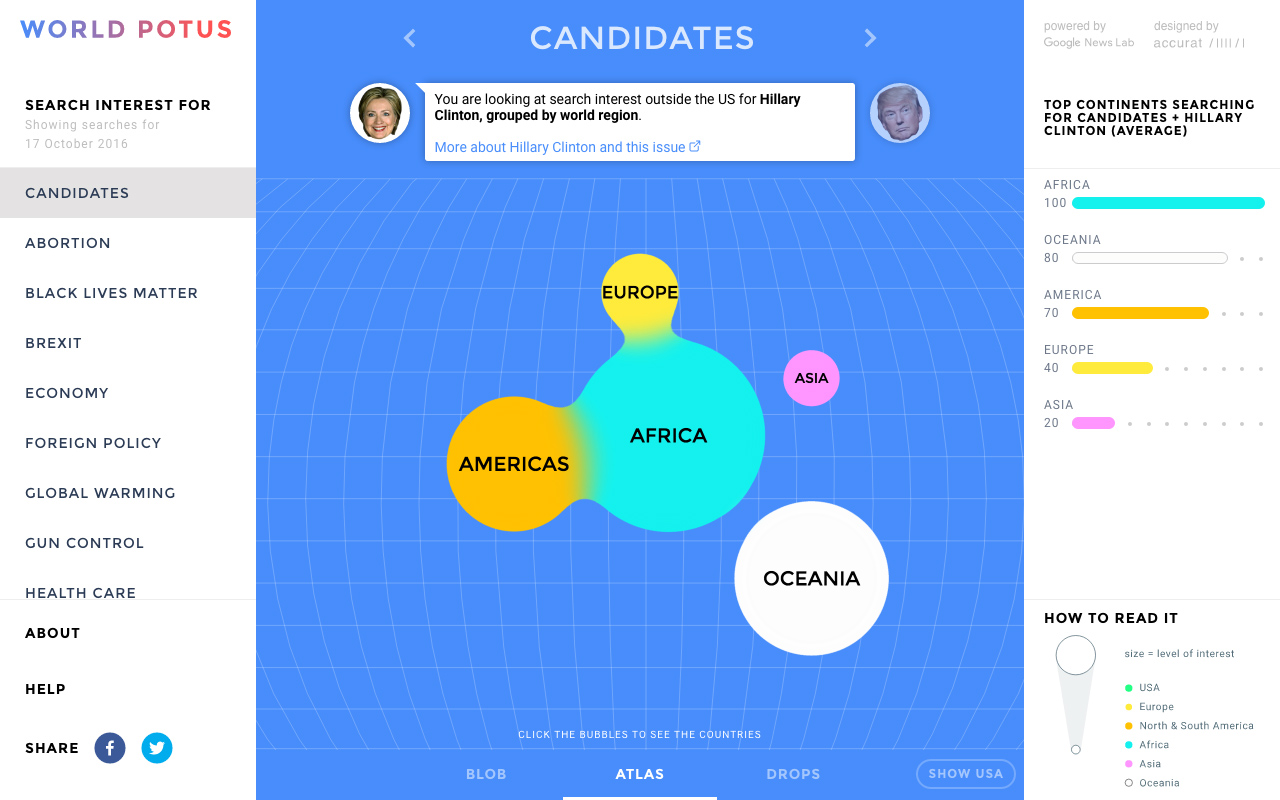
Solution
World POTUS showed real–time, non–U.S. searches related to issues at stake in the American election. In the deployed app, spherical, lava–like forms shrunk and swelled depending on search volume. This allowed us to show definitive index rankings as relative to previous days,’ and in comparison to other nations. Our goal was to convey the fluidity of conversations and the complexity of discourse, with sensitivity toward people’s nuanced feelings regarding contentious topics.
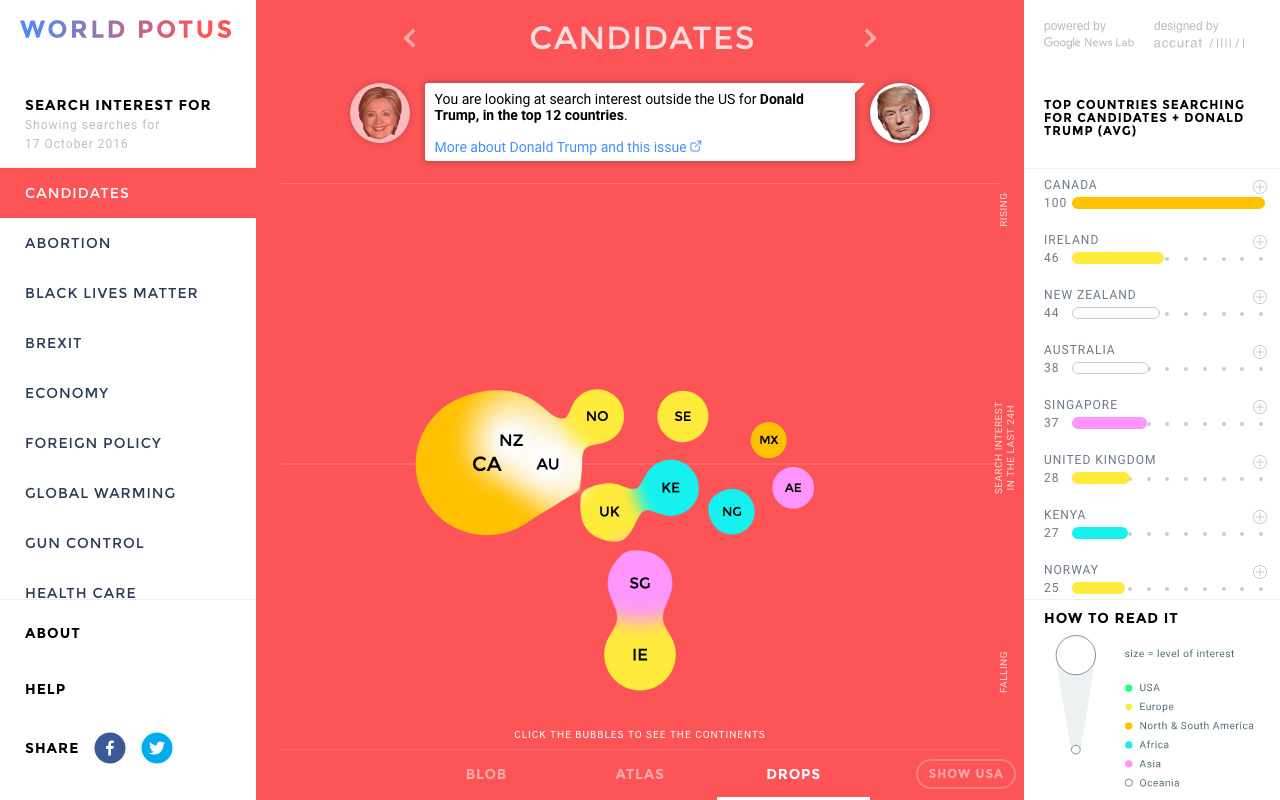
The app is built around three inter–dependent views. "Blob," "Atlas," and "Drops" are all based on the same organic, bubble-like shape that morphs during navigation.
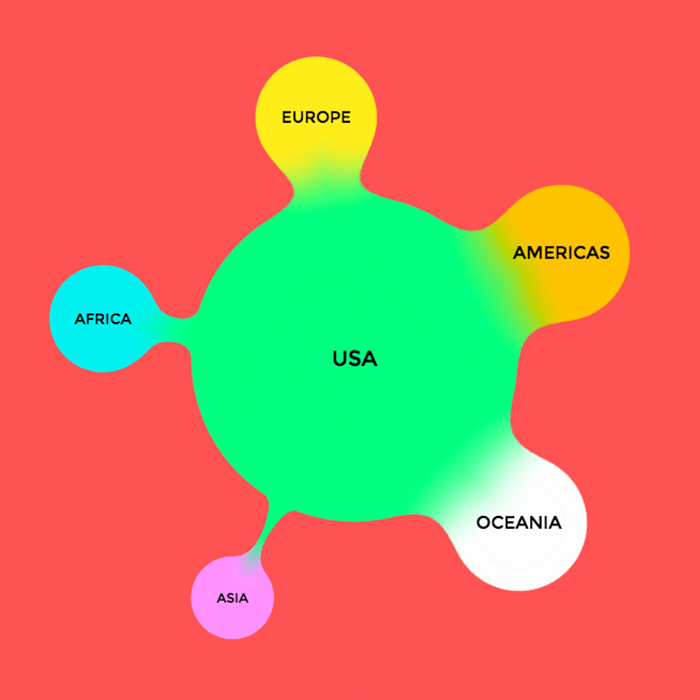
BLOB view: The proximity of bubbles is based on overall similarity in search patterns.
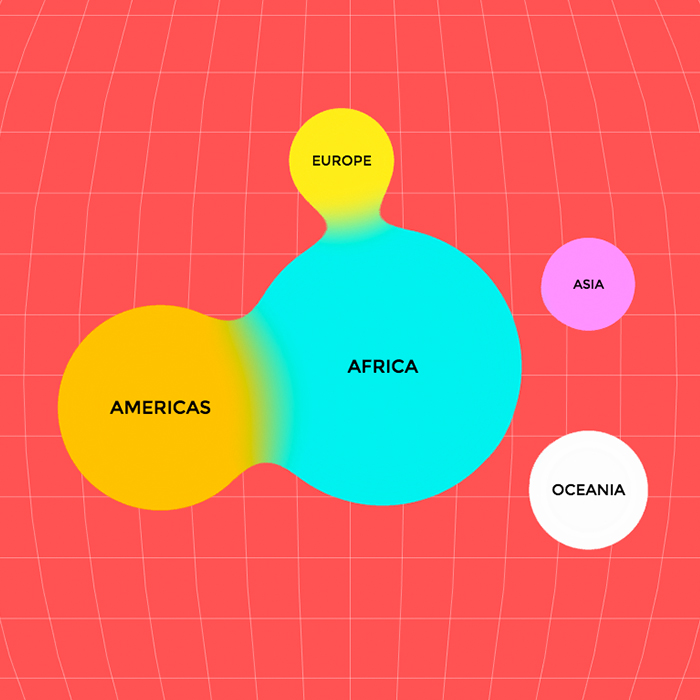
ATLAS: Countries and world regions are grouped by geography into five regions.
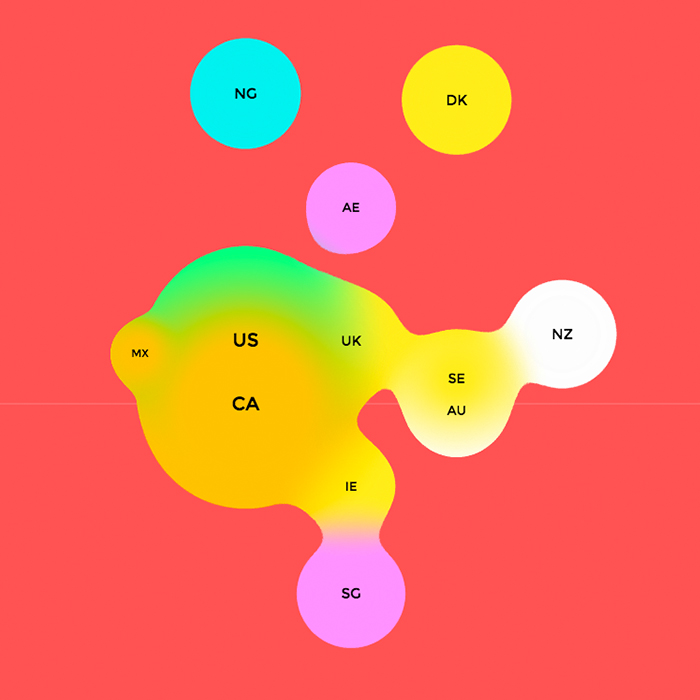
DROPS: Bubbles are oriented vertically based on search data from the past 24 hours.
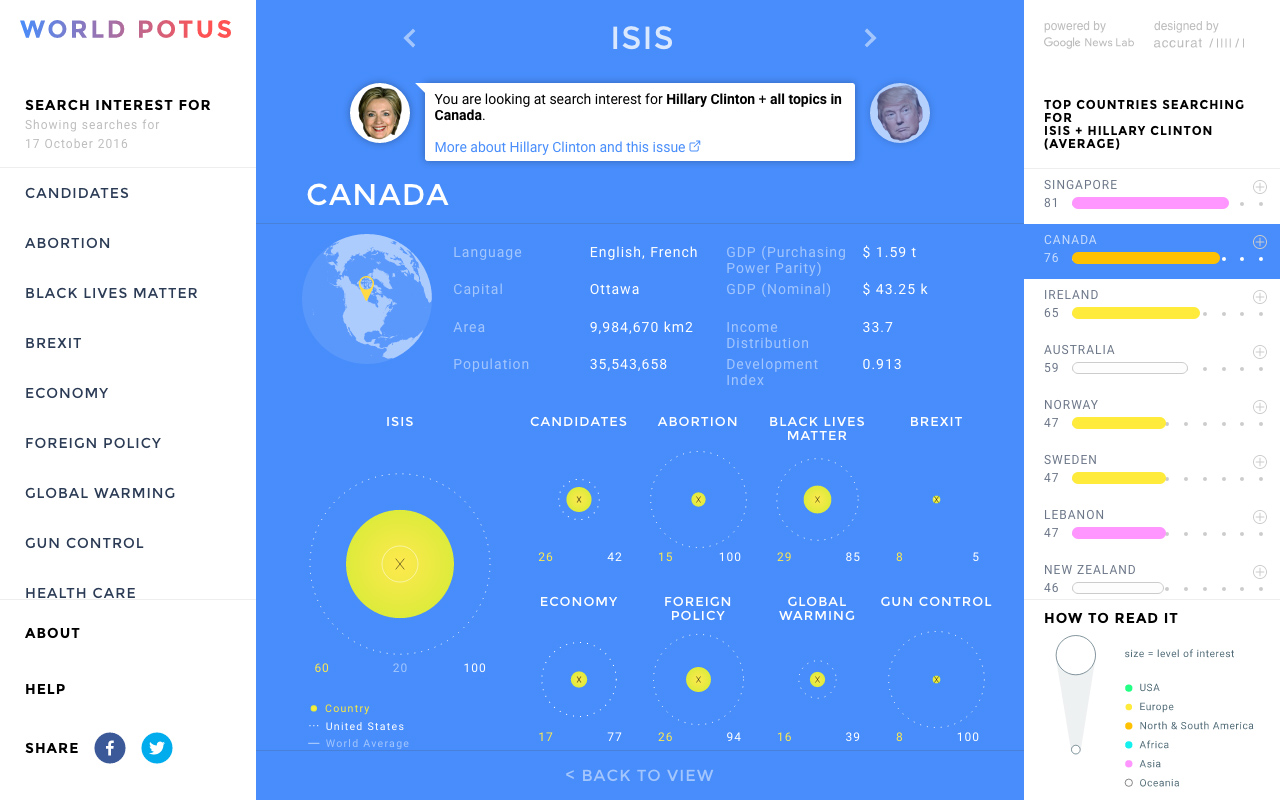
While we began experiments and prototypes with SVG filters, through trial and error we found that WebGL shaders suited the interactive utility better without compromising cross-device functionality, or browser support.
"In the end, it makes for an excellent tool for identifying which issues really are national issues, versus which ones are of critical interest internationally."
– Fast Company
– Fast Company
Results
World POTUS was well–received by journalists, appearing on Google Trends’ homepage as a top tool for news organizations. It was cited by outlets such as Wired↗ and Fast Company↗, both of which noted its ability to surface surprising insights. "The world wants to know where Clinton and Trump stand on ISIS and climate change," a Fast Company journalist explained in their coverage. "Abortion and gun control? Not so much." Ironically, broadening the perspective to a global level served to show the importance of each ballot cast in America.
Team
Amin Al Hazwani
Marco Bernardi
Davide Ciuffi
Paolo Corti
Luca Falasco
Pietro Guinea Montalvo
Giorgia Lupi
Simone Quadri
Tommaso Renzini
Gabriele Rossi
Cesare Soldini
Marco Vettorello
Tommaso Zennaro
Francesco Costa
Simone Tolomelli
Alberto Cairo
Simon Rogers
Jennifer Lee
Press
Wired
Fast Company
Services
Interactive
Dataviz
Storytelling
Experience
Dataviz, Experience, WebApp, and Mobile App Design